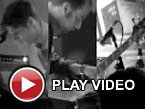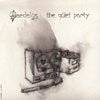 The Quiet Party is a re-mix EP of tracks from Los Angeles avant-garde hip hop producer Daedelus' Inventiondisc, including interpretations from the good company of producer/DJMadlib, the Antipop Consortium's High Priest, along with MCs AbstractRude and The Weather's Busdriver. Opening up the disc, "Playing Parties(Yesterdays New Quintet The Stars Remix)" sees Madlib mixing loose,jazzy drums and percussion with a repeating, dreamy piano progression,peppered with a minimal, controlled overdriven melody, upright bassstring slides and assorted bips and bleeps for an overall warmingtrack. Choppy drum machine and quirky keyboard patterns move "MuggleBorn (High Priest ESP Remix)" along for the Priest to convey hissignatory, precise rhymes and rhythms. "Girls" has Abstract Rude andBusdriver trading rhymes to swoon the ladies with over a backing trackof lounge/exotica motifs nailed down by tight beats and the "shoop" ofopen hi-hats, all topped off with orchestral string swells. Availableonly of the CD version of this EP, Daedelus' "A Touch of Spring" mixesearly 60's kitchy big band with a TV show soundtrack-styled feel to afamiliar 80's synth-pop riff that still has me smirking - all set tosharp drumkit samples. Daedulus' interesting and recognizablecompositional style is not only solid on its own, but also stands tooffer up great source material.
The Quiet Party is a re-mix EP of tracks from Los Angeles avant-garde hip hop producer Daedelus' Inventiondisc, including interpretations from the good company of producer/DJMadlib, the Antipop Consortium's High Priest, along with MCs AbstractRude and The Weather's Busdriver. Opening up the disc, "Playing Parties(Yesterdays New Quintet The Stars Remix)" sees Madlib mixing loose,jazzy drums and percussion with a repeating, dreamy piano progression,peppered with a minimal, controlled overdriven melody, upright bassstring slides and assorted bips and bleeps for an overall warmingtrack. Choppy drum machine and quirky keyboard patterns move "MuggleBorn (High Priest ESP Remix)" along for the Priest to convey hissignatory, precise rhymes and rhythms. "Girls" has Abstract Rude andBusdriver trading rhymes to swoon the ladies with over a backing trackof lounge/exotica motifs nailed down by tight beats and the "shoop" ofopen hi-hats, all topped off with orchestral string swells. Availableonly of the CD version of this EP, Daedelus' "A Touch of Spring" mixesearly 60's kitchy big band with a TV show soundtrack-styled feel to afamiliar 80's synth-pop riff that still has me smirking - all set tosharp drumkit samples. Daedulus' interesting and recognizablecompositional style is not only solid on its own, but also stands tooffer up great source material.samples:



 I call it smooth and sickeningly so. The lyrics go down easy, the beatsfloat like a bed of feathers, and the melodies are maddeningly similarthroughout the entire album. Try meshing together the sounds of hip-hopand some fragments of 70s, 80s, and 90s pop and rock music (it's reallya very easy thing to imagine) and what might emerge is something likeBrassy. There's some funky bass rhythms that twitch and gallop here andthere and some of the beats are truly infectious but those damn vocalsare like police sirens just when I thought I'd gotten away with it.It's not that the vocals aren't performed by a talentless group ofperformers, it's just that the content is empty, repetitive, andusually far too giddy. On "Where Did You Get That Funk?" the title isrepeated a few times during the chorus while a frighteningly cleanrhythm accentuated by cleverly placed bass slaps brings to mind imagesof various creatures dancing in place somewhere within Willy Wonka'sChocolate Factory. It's hilarious to think about when the music isn't playing.Sitting through the music is a chore and after about the fourth songeverything bleeds together and ends up sound exactly the same. Whilethere are some enjoyable moments, the general attitude of every songmakes me wonder why this group hasn't appeared on a certain televisionstation and taken home ten or twelve awards yearly. Maybe I'm being abit harsh. There is, after all a minute and twelve seconds ofdistinctive rest called "Swett's Muse." In addition, "Gettin Wise" doesmanage to convey its freakiness without sending me over the edge ofsanity (at least I don't immediately reach for the skip button). By themiddle of the album, however, I was capable of predicting exactly whateach track was going to sound like. It's catchy, it's sort of funky(though in a very clean way), and is easy to swallow but it also wearsits welcome out very quickly.
I call it smooth and sickeningly so. The lyrics go down easy, the beatsfloat like a bed of feathers, and the melodies are maddeningly similarthroughout the entire album. Try meshing together the sounds of hip-hopand some fragments of 70s, 80s, and 90s pop and rock music (it's reallya very easy thing to imagine) and what might emerge is something likeBrassy. There's some funky bass rhythms that twitch and gallop here andthere and some of the beats are truly infectious but those damn vocalsare like police sirens just when I thought I'd gotten away with it.It's not that the vocals aren't performed by a talentless group ofperformers, it's just that the content is empty, repetitive, andusually far too giddy. On "Where Did You Get That Funk?" the title isrepeated a few times during the chorus while a frighteningly cleanrhythm accentuated by cleverly placed bass slaps brings to mind imagesof various creatures dancing in place somewhere within Willy Wonka'sChocolate Factory. It's hilarious to think about when the music isn't playing.Sitting through the music is a chore and after about the fourth songeverything bleeds together and ends up sound exactly the same. Whilethere are some enjoyable moments, the general attitude of every songmakes me wonder why this group hasn't appeared on a certain televisionstation and taken home ten or twelve awards yearly. Maybe I'm being abit harsh. There is, after all a minute and twelve seconds ofdistinctive rest called "Swett's Muse." In addition, "Gettin Wise" doesmanage to convey its freakiness without sending me over the edge ofsanity (at least I don't immediately reach for the skip button). By themiddle of the album, however, I was capable of predicting exactly whateach track was going to sound like. It's catchy, it's sort of funky(though in a very clean way), and is easy to swallow but it also wearsits welcome out very quickly.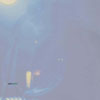 Expanding on and experimenting with a given style is an artist's right.Just ask John Zorn. But what happens when an influential artists delvesinto unoriginal, boring territory? Take Pole as an obvious example.Stefan Betke's first three releases embodied a minimalist, asceticaesthetic, from the atmospheric crackles of his broken Walfdorf 4-Polefilter unit to the album names themselves. Though he may not haveinvented the notion of incorporating static sounds into a dubframework, he clearly spearheaded the musical trend that would take onsuch names as "clicks and cuts" and "glitch." By his '3' album,however, many critics felt that Betke was a one trick pony, havingmaxxed out the potential of his style. So naturally we should expectthe artist to expand and experiment. After the stylistic cues of hisrecent '90/90' and '45/45' EPs, as well as the eclectic themecompilations on his ~scape imprint, the sound of his latest full-lengthshould not surprise those who have been keeping up. Still, that doesn'tmean we shouldn't feel disappointed. Here's an artist who could havepotentially added more organic roots and reggae elements into hismusic, progressing further in the natural direction his music hadseemed to take after the first trilogy. Insteaad, we get a starkdigression, where the underlying pops and crackles have been wipedclean and out-of-place percussive, instrumental, and even vocalelements have been included. A long way down the road from the glitchmovement, this self-title album reeks of pandering to a crossover indiehip hop scene without the b-boy comprehension of a Prefuse 73 or aDabrye. Def Poetry riffs from rapper Fat Jon come across awkward andlost over Betke's uneasy new musical failure. In layman's terms, Itried to like this. Really. I did. But it sucks. It just sucks.
Expanding on and experimenting with a given style is an artist's right.Just ask John Zorn. But what happens when an influential artists delvesinto unoriginal, boring territory? Take Pole as an obvious example.Stefan Betke's first three releases embodied a minimalist, asceticaesthetic, from the atmospheric crackles of his broken Walfdorf 4-Polefilter unit to the album names themselves. Though he may not haveinvented the notion of incorporating static sounds into a dubframework, he clearly spearheaded the musical trend that would take onsuch names as "clicks and cuts" and "glitch." By his '3' album,however, many critics felt that Betke was a one trick pony, havingmaxxed out the potential of his style. So naturally we should expectthe artist to expand and experiment. After the stylistic cues of hisrecent '90/90' and '45/45' EPs, as well as the eclectic themecompilations on his ~scape imprint, the sound of his latest full-lengthshould not surprise those who have been keeping up. Still, that doesn'tmean we shouldn't feel disappointed. Here's an artist who could havepotentially added more organic roots and reggae elements into hismusic, progressing further in the natural direction his music hadseemed to take after the first trilogy. Insteaad, we get a starkdigression, where the underlying pops and crackles have been wipedclean and out-of-place percussive, instrumental, and even vocalelements have been included. A long way down the road from the glitchmovement, this self-title album reeks of pandering to a crossover indiehip hop scene without the b-boy comprehension of a Prefuse 73 or aDabrye. Def Poetry riffs from rapper Fat Jon come across awkward andlost over Betke's uneasy new musical failure. In layman's terms, Itried to like this. Really. I did. But it sucks. It just sucks. 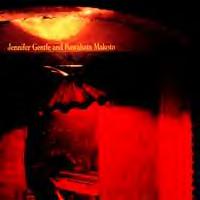 Jennifer Gentle's newest release is a live disc documenting a 2002 show in their native Italy during which they were joined on stage by the irrepressible Kawabata Makoto of Acid Mothers Temple. I'm not sure what, if anything, Makoto's monolithic acid-guitar stylings have in common with Jennifer Gentle's eclectic psych-pop. Perhaps nothing, but once the opening drones begin all such questions melt away.
Jennifer Gentle's newest release is a live disc documenting a 2002 show in their native Italy during which they were joined on stage by the irrepressible Kawabata Makoto of Acid Mothers Temple. I'm not sure what, if anything, Makoto's monolithic acid-guitar stylings have in common with Jennifer Gentle's eclectic psych-pop. Perhaps nothing, but once the opening drones begin all such questions melt away. Italian music listeners seem to have an enduring interest in rare psychedelic, progressive and kosmische music from the late 60's and 70's. There is a clutch of Italian labels like Akarma, Comet and Horizon that tirelessly pump out deluxe reissues of obscure chestnuts from America and Europe's recent rock past. Not surprisingly, a number of new groups have come out of Italy in the last few years that owe a tremendous debt to this tradition of psychedelic esoterica.
Italian music listeners seem to have an enduring interest in rare psychedelic, progressive and kosmische music from the late 60's and 70's. There is a clutch of Italian labels like Akarma, Comet and Horizon that tirelessly pump out deluxe reissues of obscure chestnuts from America and Europe's recent rock past. Not surprisingly, a number of new groups have come out of Italy in the last few years that owe a tremendous debt to this tradition of psychedelic esoterica.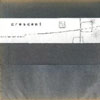 Comprised of members of both Movietone and Flying Saucer Attack,Crescent was born of the spacy post-rock scene that arose from Bristolin the mid-1990s. Vastly less interesting than either of those bands,Crescent has released a small handful of recordings since itsinception. Their latest, and first for Fat Cat, recalls the playfulorgan melodies and percussion of Pram; the slightly trippy, moody brassinflections of Legendary Pink Dots; and the mournful, jarring vocals ofJoy Division. This may sound like a great formula, but somehow Crescentjust doesn't pull it off. Overall, the raw, rough sound of By the Roads and the Fieldsmakes for a thought-provoking atmosphere, but ultimately does notcontribute anything to make the album compelling. The vocals of MattJones in particular tend to drag the music down. His monotone, sullenpresentation of the ponderous lyrics makes them far too heavy for thealbum's strong point, the sparse instrumentation. "Mica," the besttrack, seems to be so largely due to the fact that it doesn't havevocals on it. Devotees of Flying Saucer Attack and the subsequentprojects it spawned would be wise to wait for this fall's forthcomingMovietone record rather than pick up Crescent's latest offering.
Comprised of members of both Movietone and Flying Saucer Attack,Crescent was born of the spacy post-rock scene that arose from Bristolin the mid-1990s. Vastly less interesting than either of those bands,Crescent has released a small handful of recordings since itsinception. Their latest, and first for Fat Cat, recalls the playfulorgan melodies and percussion of Pram; the slightly trippy, moody brassinflections of Legendary Pink Dots; and the mournful, jarring vocals ofJoy Division. This may sound like a great formula, but somehow Crescentjust doesn't pull it off. Overall, the raw, rough sound of By the Roads and the Fieldsmakes for a thought-provoking atmosphere, but ultimately does notcontribute anything to make the album compelling. The vocals of MattJones in particular tend to drag the music down. His monotone, sullenpresentation of the ponderous lyrics makes them far too heavy for thealbum's strong point, the sparse instrumentation. "Mica," the besttrack, seems to be so largely due to the fact that it doesn't havevocals on it. Devotees of Flying Saucer Attack and the subsequentprojects it spawned would be wise to wait for this fall's forthcomingMovietone record rather than pick up Crescent's latest offering.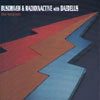 Asthe Weather, Los Angeles MCs Busdriver and Radioinactive dispense quickcut, weaving and rapid-fire rhymes with free-association styled contentranging from humorous to brilliant. Along with sample-basedcompositions and production from studio ace Daedelus, the trio havecollaborated on The Weather for sixty minutes of blisteringrhymes and hip hop meets clever musical arrangements, wierdness andsatire. "Pen's Oil" opens with a 18's inspired orchestration set tofunky drums and laid-back piano riffing that shifts to double time tokeep up with the speedy vocal dispatching. The playfully titled "CarlWeathers" consists of a full backing that includes machine beats,percussion and upright bass with a chorus that sings a line from atypical weather report while the duo convey simultaneous rhymes andbreak away for individual segments. A sampled audience clapping outsyncopated rhythms sets "Fine For A Robot" in motion for a soulfultrack when Busdriver, tongue in cheek, beautifully sings a loving odeto a machine. It then switches to drums and piano flourishes whenRadioinactive gets the sassy rhymes going for the robot girl. Daedelus'production on "Raffle Ticket Blues" employs dark, minor key jazz piano,bass and brushed drums segments with tinny machine beats forRadioinactive's wordplay in which the piece's sections are clearlymarked off based on the words per minute. The Weather's interestinglyrics and vocal talents of leaving no space unfilled are equallymatched by their ability to let lines breathe by leaving space betweenwords; all complemented nicely by Daedelus' rhythmic soundmanipulation.
Asthe Weather, Los Angeles MCs Busdriver and Radioinactive dispense quickcut, weaving and rapid-fire rhymes with free-association styled contentranging from humorous to brilliant. Along with sample-basedcompositions and production from studio ace Daedelus, the trio havecollaborated on The Weather for sixty minutes of blisteringrhymes and hip hop meets clever musical arrangements, wierdness andsatire. "Pen's Oil" opens with a 18's inspired orchestration set tofunky drums and laid-back piano riffing that shifts to double time tokeep up with the speedy vocal dispatching. The playfully titled "CarlWeathers" consists of a full backing that includes machine beats,percussion and upright bass with a chorus that sings a line from atypical weather report while the duo convey simultaneous rhymes andbreak away for individual segments. A sampled audience clapping outsyncopated rhythms sets "Fine For A Robot" in motion for a soulfultrack when Busdriver, tongue in cheek, beautifully sings a loving odeto a machine. It then switches to drums and piano flourishes whenRadioinactive gets the sassy rhymes going for the robot girl. Daedelus'production on "Raffle Ticket Blues" employs dark, minor key jazz piano,bass and brushed drums segments with tinny machine beats forRadioinactive's wordplay in which the piece's sections are clearlymarked off based on the words per minute. The Weather's interestinglyrics and vocal talents of leaving no space unfilled are equallymatched by their ability to let lines breathe by leaving space betweenwords; all complemented nicely by Daedelus' rhythmic soundmanipulation.  Journalists invent music sub-genres when they get tired of comparingmusical artists to another musical act. While Icelander OlafurJosephsson is once again showcasing his amazing playing, arrangement,and compositional talents for his second full-length disc as StafrænHákon, it's painfully difficult to escape the comparisons to Mogwai.(In addition, it's rather ironic than Josephsson now makes Glasgow hishome.) All of his music is instrumental once again on this, his firstrelease to be put out through somebody other than himself. For tensongs, the guitar and effects-driven melodies are a blissful wash ofdrifting audio landscapes. It's quite easy to get completely lost inthe music's beauty. Numerous songs like "Tætir rækju" pulse with asubtle beat and move within somewhat predictable, and enjoyable whilebeat-less tunes like "Grifflur" are chilling and turbulent like thebright moonlight reflecting off of cold, icy waters. With the additionof organic drum work and chiming sounds, however, songs like the closer"Safi" are unmistakably resemblant of Mogwai's tunes from their EP +release. There's nothing unpleasant about any of the songs, but what'slacking perhaps is an element of the unexpected, the unpredictabile, orchaos. There's so much that can be done with this music, but Josephssonchooses a route which leaves most of the music completely as is. Whileit may reduce the chances of being accused of being gimmicky, it doessound derivative. Skvettir Edik à Ref is a good second albumand will surely please a ton of fans of the more gentle side ofinstrumental guitar music. There is a load of potential for StefrænHákon to be amazing but it's just not quite at that level yet.
Journalists invent music sub-genres when they get tired of comparingmusical artists to another musical act. While Icelander OlafurJosephsson is once again showcasing his amazing playing, arrangement,and compositional talents for his second full-length disc as StafrænHákon, it's painfully difficult to escape the comparisons to Mogwai.(In addition, it's rather ironic than Josephsson now makes Glasgow hishome.) All of his music is instrumental once again on this, his firstrelease to be put out through somebody other than himself. For tensongs, the guitar and effects-driven melodies are a blissful wash ofdrifting audio landscapes. It's quite easy to get completely lost inthe music's beauty. Numerous songs like "Tætir rækju" pulse with asubtle beat and move within somewhat predictable, and enjoyable whilebeat-less tunes like "Grifflur" are chilling and turbulent like thebright moonlight reflecting off of cold, icy waters. With the additionof organic drum work and chiming sounds, however, songs like the closer"Safi" are unmistakably resemblant of Mogwai's tunes from their EP +release. There's nothing unpleasant about any of the songs, but what'slacking perhaps is an element of the unexpected, the unpredictabile, orchaos. There's so much that can be done with this music, but Josephssonchooses a route which leaves most of the music completely as is. Whileit may reduce the chances of being accused of being gimmicky, it doessound derivative. Skvettir Edik à Ref is a good second albumand will surely please a ton of fans of the more gentle side ofinstrumental guitar music. There is a load of potential for StefrænHákon to be amazing but it's just not quite at that level yet. 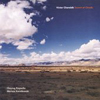 Combining cultural (i.e., traditional) instrumentation and phrasingwith more contemporary music always ends up producing something far toonew age and cheesey. It's a shame, especially when left as seperateentities, each can be quite gorgeous and ear-opening. Victor Chorobikand company have attempted to fuse various Tibetan sounds with those ofjazz and classical descent. The results are, at best, mixed andself-limiting. Exotic flutes are mixed with soprano and tenorsaxophones and each makes the other stand out like a sore thumb: thetwo simply don't fuse as well as the musicians would like to think.Lengthy tracks are accompanied by endlessly repeating drum patternswhile easy-going and laid back melodies shine over them, only themelodies aren't all that exciting or attention-grabbing. When thetraditional instrumentation and structures are left to themselves theresults are a little different. Chants, spoken-word passages, woodenflutes, and various guitars all mix to form something that borders onthe spiritual; they at least sound as if they are of a religiousbackground. Repeated listens will reveal that the native instrumentsare never truly left alone, however. There's always a keyboard of somekind attempting to add to the mystery and awe that native (or justplain alien) music, when completely naked, so often has the power ofevoking. The result is a pure stinking cheese that sucks the life outof the source material. This is nowhere more evident than on "Mantra ofGuru Rinpoche." A lone chant is performed only to be interrupted by acompletely pointless combination of shimmering keyboard sounds and lowbass throbbings. I've never been a big fan of these kinds of culturalcrossings precisely because they rob the uniqueness out of eachother.That's not to say that every single one of them are doomed to failure,but hearing the original stuff as documented in the field always endsup inspiring me more than what is meticulously calculated andconsidered within the studio. There is some beauty to be found here,but be prepared to be offended along the way. -
Combining cultural (i.e., traditional) instrumentation and phrasingwith more contemporary music always ends up producing something far toonew age and cheesey. It's a shame, especially when left as seperateentities, each can be quite gorgeous and ear-opening. Victor Chorobikand company have attempted to fuse various Tibetan sounds with those ofjazz and classical descent. The results are, at best, mixed andself-limiting. Exotic flutes are mixed with soprano and tenorsaxophones and each makes the other stand out like a sore thumb: thetwo simply don't fuse as well as the musicians would like to think.Lengthy tracks are accompanied by endlessly repeating drum patternswhile easy-going and laid back melodies shine over them, only themelodies aren't all that exciting or attention-grabbing. When thetraditional instrumentation and structures are left to themselves theresults are a little different. Chants, spoken-word passages, woodenflutes, and various guitars all mix to form something that borders onthe spiritual; they at least sound as if they are of a religiousbackground. Repeated listens will reveal that the native instrumentsare never truly left alone, however. There's always a keyboard of somekind attempting to add to the mystery and awe that native (or justplain alien) music, when completely naked, so often has the power ofevoking. The result is a pure stinking cheese that sucks the life outof the source material. This is nowhere more evident than on "Mantra ofGuru Rinpoche." A lone chant is performed only to be interrupted by acompletely pointless combination of shimmering keyboard sounds and lowbass throbbings. I've never been a big fan of these kinds of culturalcrossings precisely because they rob the uniqueness out of eachother.That's not to say that every single one of them are doomed to failure,but hearing the original stuff as documented in the field always endsup inspiring me more than what is meticulously calculated andconsidered within the studio. There is some beauty to be found here,but be prepared to be offended along the way. - 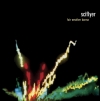 It used to be that when a band was called shoegazer music it was descriptive enough to illustrate exactly what someone would hear when they put the album on. These days, there are so many bands recording music that passes as shoegazer that it's almost evolved into another genre entirely, and none of it really resembles the original sound. Unfortunately, most of the bands in this genre possess little originality and more than their fair share of mediocrity. Sciflyer, hot off two self-released EPs, prove on their debut that there is still a chance for this kind of music while also displaying everything that's wrong with the psychedelic rock scene.
It used to be that when a band was called shoegazer music it was descriptive enough to illustrate exactly what someone would hear when they put the album on. These days, there are so many bands recording music that passes as shoegazer that it's almost evolved into another genre entirely, and none of it really resembles the original sound. Unfortunately, most of the bands in this genre possess little originality and more than their fair share of mediocrity. Sciflyer, hot off two self-released EPs, prove on their debut that there is still a chance for this kind of music while also displaying everything that's wrong with the psychedelic rock scene.